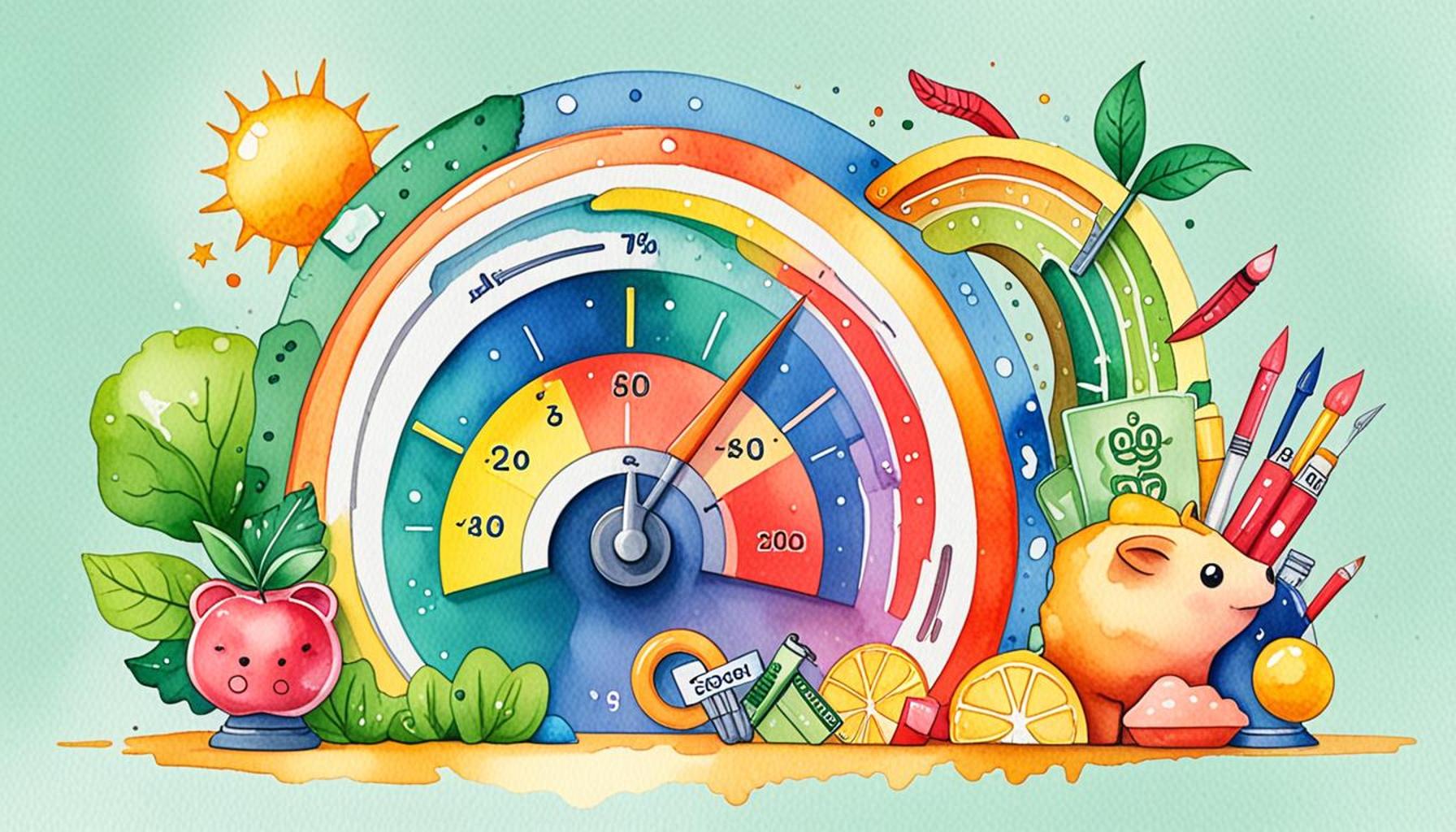How to Smartly Improve Your Credit Score

The Importance of Your Credit Score
Your credit score is a vital aspect of your financial health. It acts as a numerical representation of your creditworthiness, which lenders and financial institutions use to gauge the risk of lending you money. When you apply for loans, credit cards, or even seek to rent an apartment, your credit score can significantly influence the decisions made by landlords and lenders. A higher credit score not only increases your chances of getting approved for credit but can also lead to lower interest rates, saving you money over time.
Key Components of Your Credit Score
To ensure you’re on the right track, it’s essential to understand the various components that influence your credit score:
- Payment History: This is one of the most important factors. Lenders want to see a record of timely payments on your bills and loans. For example, paying your credit card bill on time each month shows potential lenders that you are reliable and responsible, which can have a positive impact on your score.
- Credit Utilisation: This reflects how much credit you are using compared to your credit limit. Keeping your credit card balances low—ideally below 30% of your available credit—is beneficial. For instance, if your credit limit is $10,000, aim to keep your balance under $3,000 to maintain a favorable score.
- Length of Credit History: Your credit history length contributes to your score, with longer histories generally leading to higher scores. For instance, if you have had a credit card for five years, it positively affects your score compared to someone who has only opened one recently.
- Types of Credit: A diverse mix of credit types, such as credit cards, personal loans, and home loans, can be advantageous. This diversity demonstrates to lenders that you are capable of managing different types of credit responsibly.
- New Credit Inquiries: Applying for several new credit accounts in a short period can negatively impact your score. Each inquiry can signal to lenders that you may be in financial distress, so it’s wise to space out applications.
Improving Your Credit Score
Improving your credit score doesn’t have to be complicated. By adopting smart strategies, you can boost your score over time. For example, setting up automatic payments can help you ensure that bills are paid on time. Furthermore, regularly checking your credit report can help you identify any inaccuracies or areas needing improvement.
Being proactive in managing your credit can lead to a healthier financial life. Understanding these fundamental aspects of credit scoring can empower you to make informed decisions that not only improve your credit score but also open up better financial opportunities in the future.
Smart Strategies for Boosting Your Credit Score
Improving your credit score is not merely a matter of luck or chance; it requires consistent and deliberate effort. By focusing on specific strategies, you can enhance your creditworthiness and position yourself for better financial opportunities. Below are some smart strategies you can adopt:
1. Pay Your Bills on Time
One of the most important things you can do to improve your credit score is to maintain a strong payment history. Late payments can have a significant negative impact on your score, as payment history accounts for a large portion of your credit score calculation. Set up reminders or use automatic payments for regular bills such as credit cards, utilities, and loans. For example, if your credit card payment is due on the 15th of each month, arrange for the amount to be deducted from your account a few days earlier to avoid any mishaps.
2. Reduce Your Credit Card Balances
Managing your credit utilisation ratio is crucial for building a good credit score. Ideally, aim to keep your credit utilisation below 30% of your total available credit. To illustrate, if your combined credit limit across all your credit cards is $10,000, ensure that your total outstanding balance stays under $3,000. Paying off existing balances can not only improve your credit score but also free up more credit for future use.
3. Check Your Credit Report Regularly
Being proactive in checking your credit report is essential. You are entitled to a free credit report once a year from each of the major credit reporting agencies in Australia: Equifax, Experian, and illion. When you examine your report, look for errors or inaccuracies that could be dragging down your score. If you notice any discrepancies, such as accounts that do not belong to you or incorrect payment history, dispute these errors directly with the credit reporting agency to have them corrected.
4. Avoid Opening Multiple New Credit Accounts at Once
While it may be tempting to open several credit accounts to increase your available credit, doing so can backfire. Each time you apply for a new line of credit, it results in a hard inquiry on your credit report, which can lower your score. Space out your applications, focusing on applying for new credit only when absolutely necessary. For example, if you know you will need a car loan in the next few months, avoid applying for other credit products in the meantime to keep your score stable.
5. Consider Becoming an Authorized User
If you have a family member or trusted friend with a strong credit history, you might consider asking to become an authorized user on their credit card. This can help improve your credit score by allowing you to benefit from their positive payment history, as long as they make timely payments. However, it’s important to ensure that they maintain good credit habits, or it could adversely affect your credit score instead.
These strategies are just the foundation of a comprehensive approach to improving your credit score. By consistently implementing these practices, you will be able to build and maintain a strong credit history, opening doors to better financial products and lower interest rates in the future.
Additional Techniques for Elevating Your Credit Score
While the fundamental strategies outlined previously are vital, there are additional techniques to further enhance your credit score. By integrating these approaches into your financial habits, you can achieve even greater improvements in your creditworthiness.
6. Maintain Older Credit Accounts
The length of your credit history plays a crucial role in your credit score. It is usually beneficial to keep older accounts open, even if you are not actively using them. Closing older credit card accounts can shorten your credit history and potentially lower your score. For example, if you have a credit card that you opened in your early twenties and have managed well, keeping it active can help bolster your credit history. Consider using the card for minor purchases and paying off the balance each month to keep it in good standing.
7. Diversify Your Credit Mix
A healthy mix of credit types can positively influence your credit score. Credit scoring models generally reward individuals who demonstrate their ability to manage different types of credit, such as credit cards, personal loans, and home loans. If you currently only hold credit cards, consider taking out a small personal loan or another type of credit that you can reliably manage. However, remember that only take on debt you can afford to repay, and avoid stretching your finances too thin.
8. Be Cautious with Debt Consolidation
Debt consolidation can be a tempting option to improve your financial situation, but it must be approached with caution. While it can simplify your debt payments and potentially lower interest rates, consolidating multiple debts into a single loan can also negatively impact your credit score if not done wisely. Always ensure that the terms of the new loan are manageable and consider how this move will affect your overall credit utilization ratio. Before making any decisions, weigh the pros and cons carefully.
9. Monitor Your Debt-to-Income Ratio
Your debt-to-income (DTI) ratio is another crucial factor that lenders evaluate when considering your creditworthiness. This ratio compares your monthly debt payments to your gross monthly income. A lower DTI indicates that you have a manageable level of debt compared to your income, which can enhance your appeal to lenders. As a benchmark, aim for a DTI of 36% or lower. If your DTI is higher, consider strategies to reduce your debt, such as prioritizing high-interest loans or negotiating payment plans.
10. Seek Professional Guidance if Necessary
If improving your credit score feels overwhelming, consider seeking the assistance of a financial adviser or credit counseling service. These professionals can provide tailored advice based on your specific financial situation and help you devise a comprehensive plan for improving your credit score. Just ensure to choose reputable services that adhere to Australian regulations and guidelines, as some credit repair companies may not always have your best interests in mind.
Implementing these additional techniques can complement the foundational strategies already discussed and lead to a more robust and resilient credit profile. Maintaining diligence and a proactive approach will help fortify your financial future.
Conclusion
Enhancing your credit score is not just about following a checklist; it’s about building a solid foundation for your financial future. Throughout this article, we explored various strategies that can help you improve your credit score smartly. For instance, establishing a solid payment history is paramount. Making timely payments on loans and credit cards can significantly boost your score, as payment history accounts for a substantial portion of your credit rating.
Additionally, diversifying your credit mix can also be beneficial. Having a combination of credit cards, personal loans, and, if applicable, a mortgage can demonstrate to lenders that you are capable of managing different types of credit responsibly. This variety illustrates stability and reliability, but it’s crucial to only take on credit that you can manage effectively. Each method plays a significant role in shaping your creditworthiness.
It’s essential to stay informed and proactive in managing your credit. Regularly monitoring your credit report allows you to catch any inaccuracies early, while being mindful of your debt-to-income ratio helps ensure that you are not overextending yourself financially. Keeping older accounts open, even if they are not actively used, can positively impact the length of your credit history, another crucial factor in credit scoring.
Remember, achieving a higher score doesn’t happen overnight—it requires consistency and commitment to responsible financial behaviours. Small, repeated actions can yield significant improvements over time, such as paying off outstanding debts or maintaining a low balance on credit cards. Each payment is a step toward a more robust credit profile.
Additionally, if you find the process daunting, there is no shame in seeking help. Professional guidance from a financial adviser or credit counsellor can provide insights tailored to your unique situation, helping you navigate your credit journey more effectively. They can offer personalized strategies and assist with any complex issues, making it easier to understand your options.
In conclusion, by understanding the intricacies of credit scoring and implementing these strategies, you can build a healthy credit profile and open doors to better financial opportunities. Start today, and take control of your credit future—every positive action you take today will pave the way for a brighter tomorrow. Remember, your credit score is a tool that, when well-managed, can lead to favorable loan terms, lower interest rates, and even better insurance premiums in the long run.

Linda Carter is a writer and financial expert specializing in personal finance and financial planning. With extensive experience helping individuals achieve financial stability and make informed decisions, Linda shares her knowledge on the Take Care Garden platform. Her goal is to empower readers with practical advice and strategies for financial success.





